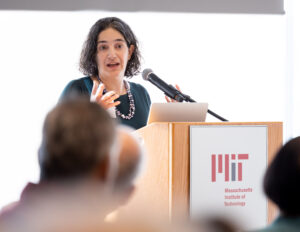What’s the point of play?

Laura Schulz delivers the fall 2023 School of Science Breakfast lecture. Photo: Steph Stevens
On Oct. 19, 2023, alumni and friends gathered for a breakfast talk hosted by the MIT School of Science featuring Laura Schulz, professor and associate head of the Department of Brain and Cognitive Sciences. Nergis Mavalvala, the Curtis (1963) and Kathleen Marble Professor of Astrophysics and dean of the School of Science, invited Schulz to share her work.
A developmental psychologist, Schulz studies how the mind creates knowledge by observing the best learners on the planet — young children. Researchers do not fully understand how children learn so much about the world so quickly while relying on their limited experiences. Schulz’s research examines how kids accomplish this feat while primarily engaging in play. Introducing Schulz’s talk, entitled “Understanding Why: Problems, Play, and Human Cognition,” Mavalvala noted that answering the question of what play contributes to cognition would give us insight into the origins of knowledge and fundamental principles of learning.
Schulz set the stage by questioning established theories of play. It could be a way to practice life skills, but Schulz noted that no research has shown a causal relationship between, for example, children’s play with toy hammers and their carpentry skills as adults. Play could be a venue for learning about physical forces, movement through space, and social interaction, but Schulz pointed out that most games require prior knowledge of space, objects, and forces. Following the assumption that learning is related to play, Schulz says she “finds ways to use play as a dependent measure of expected information gain.”
Treating children like “intuitive scientists,” Schulz and her team tested the knowledge-building practices kids use to gather information, test hypotheses, and formulate conclusions. In one experiment, Schulz hypothesized that when a child was asked to identify the number of marbles contained in an opaque box, there would be a direct relationship between the difficulty of the task and how long they would play with the box. She believed a child prompted to make a gross distinction, between for example two marbles or eight, would play less than if asked to make a fine distinction, such as between five marbles and seven. Schulz shared footage of three- and four-year-olds shaking the boxes, testing their weight, and listening to the marbles roll around. The results showed a strongcorrelation between the difficulty of the discrimination and the duration of the subjects’ play.
While reflecting on the accuracy of her predictive model, Schulz noted that the experiment had shed light on how children learn but, she asked, what did it teach us about play? Do we really believe kids play in order to acquire information and make logical discriminations? She suggested that when you give children a device and a set of instructions, more often than not what you get is chaos. To demonstrate her point, Schulz played a montage of outtakes in which test subjects failed to follow directions, in this case determining which of a set of switches activated a motor that turned a pair gears. The audience delighted as the children on screen spun the gears on their fingers, listened to the whirring of the motor, and ran the gears against their open mouths. “You wouldn’t laugh if this was your dissertation research,” Schulz quipped.
If it is not just a process of information gathering or skill building, then how does play contribute to cognition? Rather than ignoring confounding aspects of play, Schulz asked, “What if the arbitrariness is the point?” Humans play by setting up frivolous problems and testing their potential solutions. Each problem is rich in information that constrains its possible solutions and points toward a satisfactory answer. In the boardgame Clue, for example, players asked who killed a victim, where, and with which weapon know that the solution must include a person, a location, and an object. A problem facilitates the formation of pertinent ideas regardless of whether they are right or wrong. Therefore, play is a tool to encourage thinking rather than learning.
In an effort to study play on its own terms, Schulz and her team investigated the satisfaction derived from completing an arbitrary task. They prompted adults to fill in a 10 X 10 grid of circles on a computer screen, with each click of the mouse turning an outline of a circle into a solid blue circle. The test subjects had to accomplish this task five times and report how much fun they had. Some did so efficiently, clicking the circles line-by-line and top-to-bottom; others played, designing patterns and varying their approaches from one grid to the next. The participants who took the longest reported the highest levels of fun during the experiment. Schulz concluded that play must be rewarding, since some adults were willing to expend excess time and effort to complicate their solutions to the presented problem, even though they all received the same compensation.
If play is both useless and satisfying, Schulz asked, “What does that say about us? Are we doomed?” Certainly not. From her perspective, play is arbitrary but it is not irrational. The motivational system that rewards play frees our minds to invent ideas unconstrained by practicality. Problems without conclusive solutions can be sources of unexpected insights. Citing historical examples, Schulz noted that first-order logic derived from medieval attempts to concretely prove the existence of the Christian divinity, and that cryptography developed from the effort to prove that Francis Bacon was the author of Shakespeare’s plays. Play may be the most effective way to generate knowledge and to discover phenomena that are genuinely new.
Jesse Feiman | School of Science